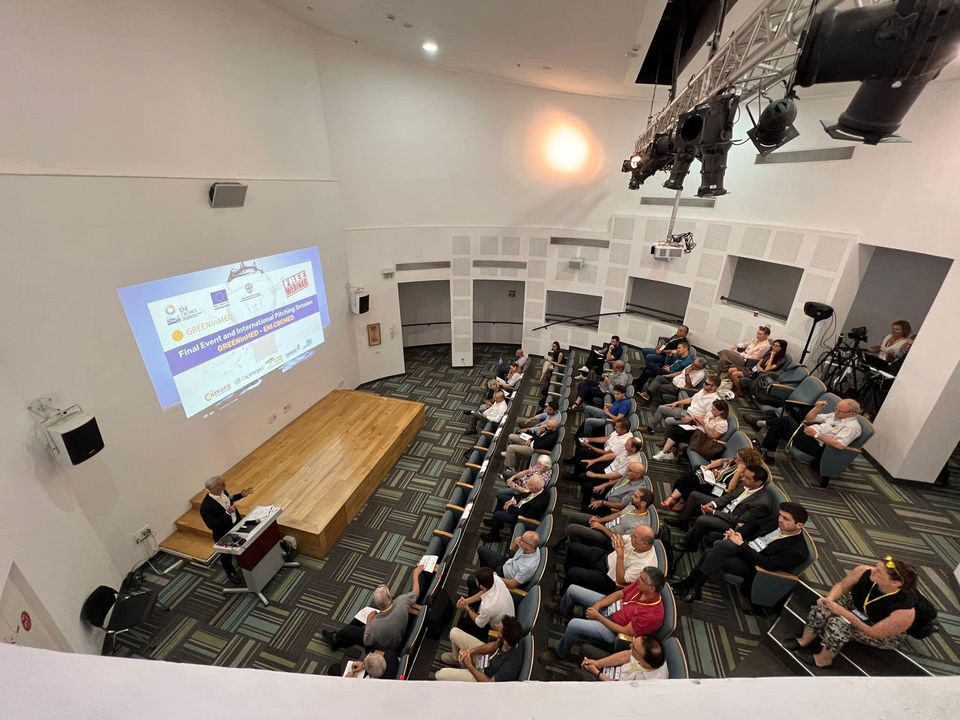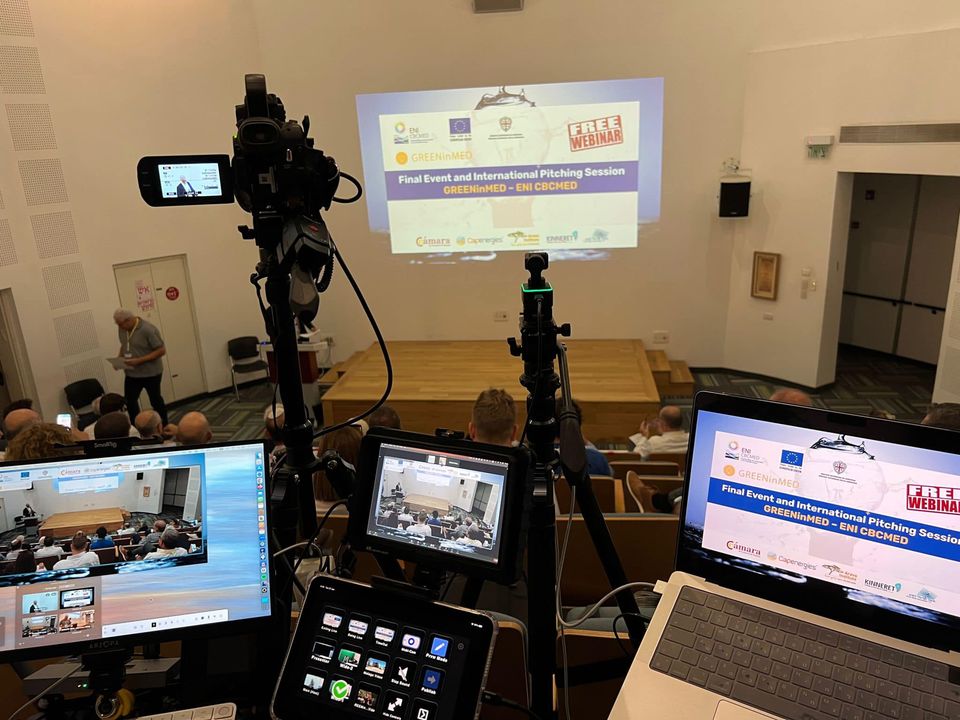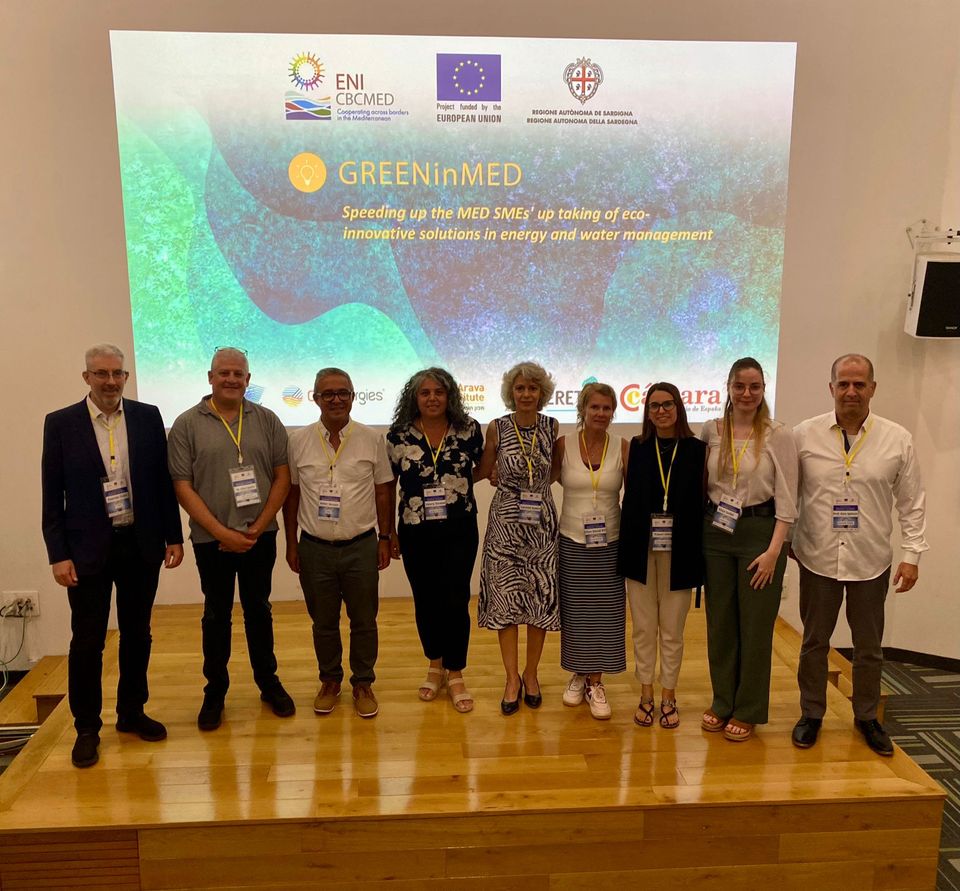GREENinMED Pitching and Final Event
Start Ups, investors, Subgrantees, entrepreneurs, project partners, students, hoteliers, representatives of the public sector connected to innovation and more, met and connected Tuesday, June 27.
This past Tuesday, eight companies from France, Spain and Israel pitched their innovative ideas for more sustainable solutions in energy and water management in the tourism industry and beyond. Each representative had up to 5 minutes to present their idea, supported by visual aids.
In the audience were the Subgrantees – 7 Israeli startups that each received a grant of 22,500 Euros during the last stage of the GREENinMED project. This grant allowed them to turn their ideas for innovative sustainable water and energy solutions into realities.
Andrea Carignani Di Novoli, the Head of the Research and Innovation Section for the European Union Mission to Israel and one of the keynote speakers of the event, was excited to see how this EU funded program achieved the specific goal of his unit, namely the cooperation between EU and non-EU countries across the Mediterranean region in tackling the enormous challenges of climate change. Mr. Carignani then went over various funding opportunities that the EU offers for non-European countries with the ENI CBC projects such as GREENinMED and Interreg projects. At the end of the event, he expressed his admiration for the pitches and the impressive level of innovation that was presented by the SMEs.
The Pitching companies and their ideas were:
1) Bio-Castle (Israel): SBP capsules – bio-augmentation in wastewater treatment
2) Bioscore (Spain): a platform specialized for sustainable tourism that enables users to choose sites based on sustainability criteria
3) Value Park (France): an air-condition system that utilizes seawater for hotels and cruise ships
4) Green-Slide (Israel): a cup washing system that can be placed in lobbies or other places in hotels and restaurants to replace disposable cups
5) Insitu-systems (France): a plug and play solution to supervise water and energy consumption – the company offers a complete range of products including software and materials
6) Tigi Solar (Israel): sustainable heat production via solar panels
7) Europe Membrane (Spain): wastewater treatment with a membrane bioreactor for the reuse of 98% of wastewater in hotels
8) OASIX (Israel): closed circle water, energy and waste infrastructure for off-grid businesses
Following the pitches, Eli Cohen, President of Israel Hotels Association and former General Manager of Mekorot shared insights from his vast background regarding tourism and water, as well as from his experience as an entrepreneur.
The coffee break was used intensely by all participants to connect and exchange ideas for future joint ventures and projects. People were inspired by the innovations of their colleagues and potential cooperation was discussed and will hopefully lead to further joint endeavors.
After the break, the Israeli entrepreneur Eytan Levy, Owner of Levy Ventures, Founder, and former CEO AqWise and Fluence, illustrated the evolution of himself and his companies; the steps from establishing one small Start-Up company with no funding, to becoming an owner of several well established and successful companies with wide international market presence and owning a US based Venture Capital Firm. His insights are extremely valuable to the start-ups and already more established companies that pitched their ideas.
The new products and innovations that the Israeli companies and start ups produced with the means of the GREENinMED funding were presented in a short video that illustrated how meaningful the funding was for – without the GREENinMED Subgrants, these new innovative products that improve water and energy management to make tourism in the MED more sustainable, would not exist.
Inbar Blum and Assaf Aharon from the Israel Innovation Authority explained about the opportunities that the Israeli government and the ISERD offers and how they promote Israeli and European cooperation.
The European project partners illustrated best practices and lessons learned from the project e.g. with the help of a 5 step plan, pointed at the (many) challenges that still to overcome on the way to sustainable tourism in the MED and offered a step-by-step strategy to overcome these.



